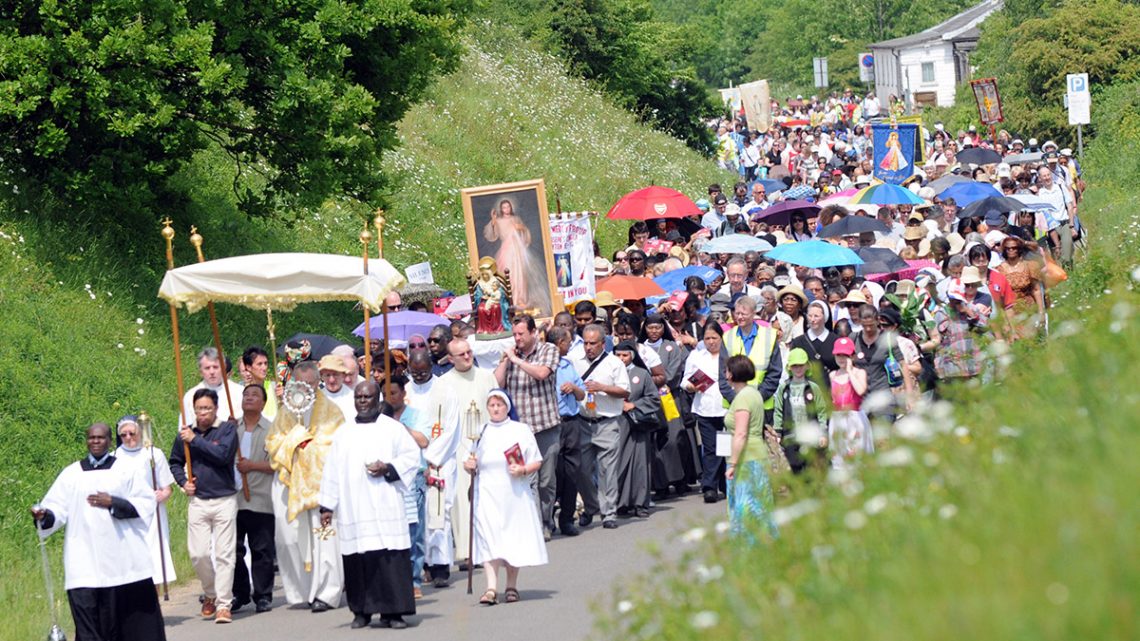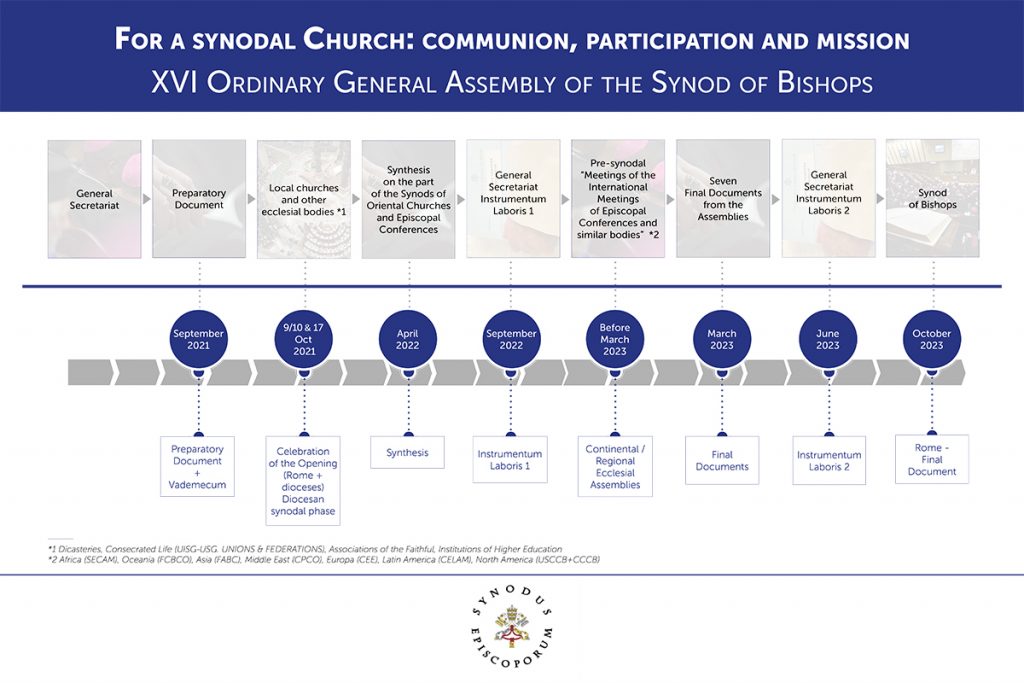Here are some answers, provided by the Bishops' Conference, to frequently asked questions on the synodal process.

Here are some answers, provided by the Bishops’ Conference, to frequently asked questions on the Synodal Process.
Synodality comes from a Greek word meaning the ‘walking together’ (syn-) on a ‘particular way’ (-hodos). The ‘particular way’ has been defined by the Synod of Bishops in its process for the Synod 2023. This can be seen in the infographic.

You can download a PDF of this infographic.
Every member of the Church has the right to speak, and the obligation to allow those charged with the work of discernment the freedom to do so. Pope Francis in his book Let us Dream says “we need a respectful, mutual listening, free of ideology and predetermined agendas”.1
This is at the heart of the process. Each diocese will form its own means of running this listening process so that it reaches as broad a scope of people as possible.
No, it involves everyone. Schools, young people, hospital chaplaincies, university chaplaincies, prison chaplaincies, the religious and consecrated communities, the societies of apostolic life, those with a distinctive charism in the church all have a voice that speaks into the conversation. Catholic organisations and charities also have a role to play in this work.
Echoing the experience of the Second Vatican Council, Ecumenical and Interreligious engagement is also encouraged, and this is best facilitated at the local level. This is an important voice from outside the Church that offers an insight into the collaboration for the good of all.
Pope Francis says “what is under discussion at synodal gatherings are not the traditional truths of Christian doctrine. The Synod is concerned mainly with how teaching can be lived and applied in the changing contexts of our time.”2
Therefore all topics can be raised but it is important to realise that not all will form part of the ongoing discussion.
The Synodal Process is not about a democratic debate. It is place of respectful mutual listening and experiencing the call of the Holy Spirit to move in new ways. Again the Pope is clear on this:
“Another temptation that so often confuses people is treating the Synod as a kind of parliament underpinned by a ‘political battle’ in which in order to govern one side must defeat the other…this goes against the spirit of the synod as a protected space of community discernment.”3
What it will do is embed at all levels of the Church a new way of listening and hearing, of discernment and action which remains faithful to the truths received but expresses them in the context of a particular time.
The whole Synodal Process is a prayerful process, rooted in the encounter with Jesus in the prayerful reading of the Sacred Scriptures and through the liturgical life of the Church and inspired by an openness to the movement of the Holy Spirit. Listening to each other is very important. Pope Francis says of the Synod of Bishops gathering itself: “we listen, we discuss in groups but above all we pay attention to what the Spirit has to say to us.”4
This discernment is not an activity done in isolation. Mutual listening and reflection are vital, as what is proposed grows from the unity and conviction that comes from the lived practice of faith within the community.
The process of spiritual discernment is incumbent on everyone’s part; truly being open to the Spirit and seeing where the local Church is being led in its own context, with the bishops listening carefully to the views of the faithful, and the faithful respecting the authentic role of the bishop as one who governs the local Church and promotes communion.5
Discernment is always orientated towards the mission of the universal Church which continually moves towards Christ, the Way, the Truth and the Life who calls his people into a unity of purpose.
The role of the Bishops’ Conference in this process is twofold. First, its Secretariat will act as an administrative point of contact for the dioceses to liaise with for the production of the documentation for the bishops, as a whole, to consider. However, and more importantly, the bishops acting together, effect a common discernment of the points raised in the particular Churches for the whole of the territory.6
The bishops, whilst remaining the authentic pastors of their particular Churches and speaking on behalf of them, also work collectively to summarise the “links of culture, tradition and common history, as well as the interconnection of social relations among citizens of the same nation.”7
It is for this reason that this part of the Diocesan Phase of the Synodal pathway has great importance.
Pope Francis has called this moment in human history as “a time of reckoning.”8
The Synodal Process is for the whole Church not just in England and Wales and the themes from the title of the Synod can help in understanding why now is the right time to consider this:
a. Communion – bringing the people together as communities in the local Church begins this prayerful insight into the ways of the Holy Spirit. When the Church gathers for the Eucharist, and what flows from it, is when the necessary self-understanding of the mission of the Church is best understood. Thus the dialogue at this level is rooted in the life of the ecclesial communities and parishes.
b. Participation – the reflections that the local Churches and communities are undertaking regarding the past 15 months of pandemic form the context of how the Catholic Church in England and Wales looks forward, not backwards, to revitalising its mission of bringing the Good News to all. The gentle call of invitation to the full practice of Catholic life, with the Eucharist at the centre of all the Church does, is an integral part of the “walking together.”
c. Mission – understanding the local situation will feed necessarily into an overview of the mission in the whole diocese. Like the tesserae of a mosaic, the picture is built up of the needs for renewal so that mission to all people is firmly rooted in the life of the local community who gather, by gentle invitation by the Lord, to worship him, to be sanctified by him and to exercise both an individual and collective prophetic voice.
The Synodal Process is a pilgrimage of the whole People of God in discerning the way the Church needs to be in its localities and worldwide at this moment in time. Anyone who has been on a pilgrimage knows that the journey there is not just travelling, but an integral part of the whole. The Synod in 2023 will be an important moment in the pilgrimage but not an end point. All who commit this process to prayer, open their hearts to the Holy Spirit and speak with confidence and engage in mutual listening will assist the Church like a pilgrim “… [to go] out from herself, open(s) herself to a new horizon, and when she comes home, she is no longer the same, so her home won’t be the same.”9
Rev. Canon Christopher Thomas
19 July 2021
1 Pope Francis, Let us Dream: the Path to a Better Future, Simon and Schuster, London, 2020, page 93
2 ibid page 84-85
3 ibid page 86
4 ibid page 85
5 Pope St John Paul II, Apostolic Exhortation, Pastores Gregis, 16 October 2003 §44
6 Pope St John Paul II, Apostolic Letter, Apostolos Suos, 21 May 1998 §13
7 Apostolos Suos, §16
8 Let us Dream, Prologue, pages 1-7
9 ibid, Epilogue, page 135